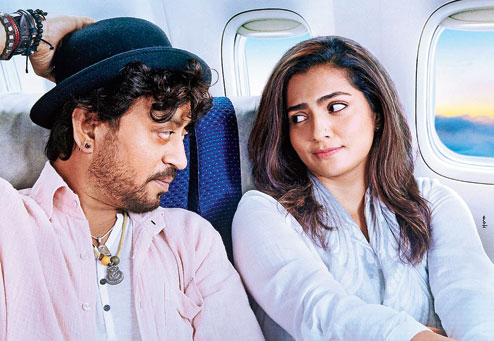
After a long break, director Tanuja Chandra is having quite a year. The filmmaker made her debut as an author earlier this year with Bijnis Woman, a collection of charming short stories from Uttar Pradesh. On November 10, Tanuja has a film — the Irrfan Khan-starrer Qarib Qarib Singlle — up for release. The maker of films lik Sangharsh and Dushman took a break from the film’s post-production at a cramped edit suite in the bylanes of Andheri in Mumbai to chat with t2.
You’ve had a film and a book this year!
I know… how eventful! (Laughs) It’s been a while since my last film (the 2008 film Hope and a Little Sugar), so it’s been a long time due. And a book is something that I have always wanted to write, but I found the idea extremely challenging and daunting. You may have a story and flair for language, but every word matters. When you write a screenplay, dialogues are fine-tuned until the last minute. You don’t have to be eloquent while writing a movie.
Why the long gap between your last film and this one?
Obviously, it wasn’t planned. There were two projects that were supposed to happen. We worked on the screenplay for a long time. I am one of those people who tend to take a long time writing. It took me six months to write Qarib Qarib Singlle. And I am happy to give my scripts time because I know it only becomes better. I wish I could write faster but I am not one of those geniuses who can. Also, even after a script is done, there’s casting, budgets, production… so much goes into making a film.
Qarib Qarib Singlle is your first romcom…
Yes! No more blood and gore this time! (Laughs) My mother (Kamna Chandra) wrote a radio play about 20 years ago that I have always liked. It’s a really cute and fun story. We went through countless drafts to make the story contemporary.
What made you cast Irrfan?
Usually when I am writing, I have an actor in mind. His character is a poet but he is also realistic and disarmingly honest. One has seen him in intense roles, but I wanted to see him play an oddball character. I remember sending him the synopsis even before the screenplay was completed.
In the film, your characters travel through Gangtok, Rishikesh and Bikaner. Is a travel film fun to shoot?
I want to say ‘yes’ but… (laughs) It is stressful. We shot in all three locations back to back, so if anything went wrong in the first city, it could potentially derail the rest of the shoot. We didn’t have the luxury of even one extra day. Rishikesh, I have been to many times and I love it, but I hadn’t been to Bikaner before. Bikaner is quite unlike the rest of Rajasthan and there are some unexplored virgin locations there.
Gangtok was my favourite. Most of my crew, including Irrfan and Parvathy (who makes her Bolly debut with this film), hadn’t been there before. I had an uncle who was stationed there, so we spent many summer vacations there. I always wanted to go back to shoot there. Irrfan kept joking that I was dragging the whole crew there to fulfill a childhood fantasy! (Laughs) But the minute he set eyes on that magnificent Teesta river, I think he understood why I wanted to shoot there. The city has changed a lot, but it is still so clean and beautiful and the people are so lovely.
You directed your first film, Dushman, in 1998 and almost two decades later, there are still only a handful of female directors...
Which is a tragedy. At least half our directors need to be female, otherwise you can’t call this an equal playing field. When I started out, there were four-five female directors and now the number is in double digits, but it needs to be more. We need more women making movies… as directors, producers, writers, cinematographers.... I really believe that it will make a difference in the kind of movies we make.
Let’s talk about Bijnis Woman. What made you write it?
I have always wanted to document short stories from Uttar Pradesh that I have heard from my family members. So when Penguin was excited by the idea, I decided to write it. I am so happy that I got a chance to write these stories because otherwise they would have been lost. Most of the people who told me those stories are gone. I felt a need to preserve them.
You come from a family of writers, including your niece, Zuni Chopra. What kind of feedback did you get from within the family?
My brother (Vikram Chandra) was my first reader. I was petrified about sending him my book because he’s a genius writer. It was great to have his positive feedback. You can’t really trust a mother’s feedback. My sister (Anupama Chopra) is a difficult person to please, but she enjoyed it. My niece is a Potterhead and this is a world completely removed from where she’s grown up. She enjoyed the stories but found some of them odd. It’s great to have storytellers in the family.
Karishma Upadhyay

